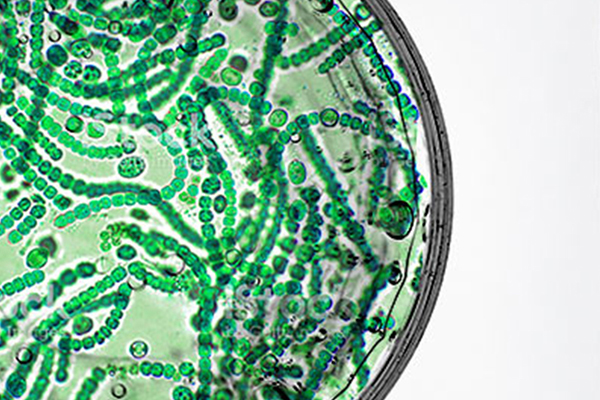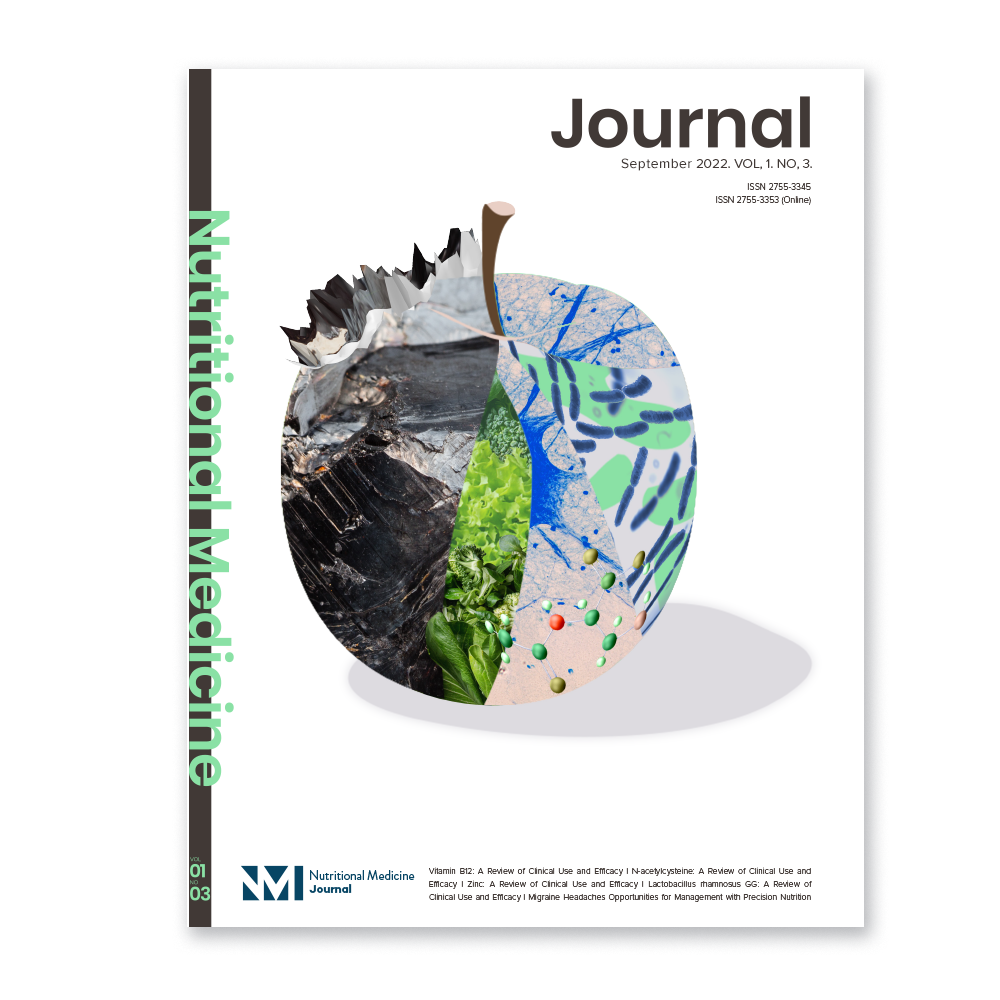Nutritional Medicine Journal
The Nutritional Medicine Journal (NMJ) is a specialist peer-reviewed scientific publication related to the application of personalised dietary interventions, foods, dietary factors, and nutritional supplements in clinical practice.
Topics include clinical nutrition, personalised nutrition, lifestyle medicine, micronutrients, amino acids, fatty acids, phytochemicals, probiotics, prebiotics, and functional beverages and foods. The aim of the NMJ is to provide health professionals with authoritative and scientifically accurate articles on topics in nutritional medicine.
Pain Management and Nutritional Medicine
Chronic pain is one of the most widespread health problems, with up to 43% of people in the UK reporting that they experience chronic pain, of which 10−14% report moderate to severely disabling chronic pain.1 Chronic pain is typically defined as pain persisting longer than 3 months, and generally refers to pain that has become a disease entity of itself and distinct from pain associated with acute injury or disease.2 As a unique disease state, chronic pain, like other chronic diseases, has unique biological features, clinical symptoms and long-term consequences. Full Article
Cite as: Brown, B. (2022) Pain management and nutritional medicine. Nutr. Med. J., 1 (3), 5-8.
Migraine Headaches: Opportunities for Management with Precision Nutrition
Chronic migraine headaches are estimated to affect between 1.4% and 2.2% of the population, and have a huge impact on wellbeing and quality of life. A diverse range of therapeutic nutritional options have been explored for migraine headaches, with varying degrees of benefit. Dietary interventions include generally healthy food plans, identification and avoidance of trigger foods, weight-loss diets, low-glycaemic-load diets, ketogenic diets, gluten-free diets, IgG-led elimination diets and a high-omega-3/low-omega-6 diet. Nutritional supplement interventions include riboflavin, niacin, homocysteine-lowering B vitamins, vitamin B12, vitamin E, vitamin D, magnesium, zinc, iron, omega-3 fatty acids, coenzyme Q10 (CoQ10), lipoic acid, soy phytoestrogens, ginger, turmeric, carnitine, 5-hydroxytryptophan (5-HTP), palmitoylethanolamide (PEA), and multi-ingredient formulas. The wide range of therapeutic options may make it challenging to approach nutritional management of migraine in a clinical setting, so a pragmatic model that helps personalise interventions from clinical signs and symptoms and reliable biomarkers would be useful, so-called ‘precision nutrition’. The aim of this narrative review is to explore the clinical evidence for nutritional medicine for migraines, including diet and nutrient-based interventions, from the perspective
of personalised or precision nutrition. Full Article
Cite as: Brown, B. (2022) Migraine headaches: opportunities for management with precision nutrition. Nutr. Med. J., 1 (3), 117-152.
Lactobacillus rhamnosus GG : A Review of Clinical Use and Efficacy
Oral Lactobacillus rhamnosus GG (LGG) supplementation is generally recognised as a safe form of supplementation, which acts as an immunomodulator, an antimicrobial, and aids cell growth and proliferation. The aim of this review was to determine diseases where oral LGG supplementation has been indicated; and assess safety, colonisation, mechanisms of action and efficacy, and provide therapeutic recommendations. LGG following supplementation can successfully colonise the gut and other areas of the body owing to the expression of unique morphological features known as pili. Twenty-two disease areas were identified where LGG supplementation has been used, to determine effects. However, small study sizes, the use of multispecies probiotics and adjuvant therapies all meant that strong evidence for the use of LGG was lacking in several disease areas. Despite this, LGG was shown to be of benefit in the reduction of risk of developing attention-deficit hyperactivity disorder and gestational diabetes mellitus, in the prevention of allergies and dental caries, for improving immune reactions following vaccines, and for the management of diarrhoea associated with cancer treatments and antibiotic use. Full Article
Cite as: Steele, C. (2022) Lactobacillus rhamnosus GG: a review of clinical use and efficacy. Nutr. Med. J., 1 (3), 70-116.
Vitamin B12: A Review of Clinical Use and Efficacy
Vitamin B12 (B12) is an essential cofactor in cellular metabolism − adequate supplies are needed for normal blood formation and neurological function, and deficiency can therefore lead to macrocytic anaemia and neurological deficits. Deficiency can be due to inadequate dietary intake, especially in vegans, but is otherwise more likely due to problems with absorption, which is more complex than that of other vitamins. Apart from vegans and people with gastrointestinal conditions, infants and children from B12-deficient mothers and the elderly are at particular risk of B12 deficiency.
Whilst in conventional medical practice B12 deficiency is generally treated with intramuscular injections, it is generally accepted that oral (per os) administration at a high dose is as effective at improving B12 status. Diagnosis of B12 deficiency is complicated by the fact that levels of B12 in the blood are maintained even when stores are low at the expense of tissue levels. Where a deficiency is suspected but serum levels are normal, other markers can be used to confirm a deficiency.
Benefits of B12 supplementation have been shown in a number of conditions, including diabetic neuropathy, back pain, mouth ulcers, autism spectrum disorder and elevated homocysteine levels, and it is generally considered to be very safe even at high dosages. Full Article
Cite as: Elgar, K. (2022) Vitamin B12 a review of clinical use and efficacy. Nutr. Med. J., 1 (3), 9-25.
N-acetylcysteine: A Review of Clinical Use and Efficacy
N-acetylcysteine (NAC) is a derivative of the amino acid cysteine and a precursor to glutathione, the master antioxidant of the body, which makes it an important compound in detoxification processes, and it is well known for its use as an antidote to paracetamol poisoning. NAC also has direct antioxidant as well as various anti-inflammatory effects, making it a useful supplement in inflammatory conditions. NAC has been extensively used for its mucolytic properties, and research has also demonstrated its ability to interrupt biofilms.
There is evidence for benefits of NAC in diverse conditions, including respiratory infections, various mental health disorders, male infertility and polycystic ovary syndrome.
NAC is generally well tolerated but has a few potential drug interactions, and caution is advised in some underlying conditions including gastrointestinal ulceration, bronchial asthma, liver and kidney failure. Full Article
Cite as: Elgar, K. (2022) N-acetylcysteine: a review of clinical use and efficacy. Nutr. Med. J., 1 (3), 26-45.
Zinc: A Review of Clinical Use and Efficacy
Zinc is an essential trace element and is required for many vital functions, including protein folding, as a co-factor for enzymes, in regulating gene expression, supporting cell membrane structure and cell signalling. It also has antioxidant and anti-inflammatory properties. As such, zinc plays an important role in growth and development, immune function, neurotransmission, vision and reproduction. Zinc deficiency is common, especially in developing countries, and can be due to dietary factors, malabsorption and alcoholic liver disease. Zinc supplementation at appropriate levels is considered safe, and has shown benefits in a wide range of medical conditions, including depression, diabetes, attention deficit hyperactivity disorder, male infertility, and the common cold in children. Full Article
Cite as: Elgar, K. (2022) Zinc: a review of clinical use and efficacy. Nutr. Med. J., 1 (3): 46-69.
Bioavailability, Food Supplements, and Clinical Efficacy
Enhanced bioavailability of food supplements is often cited as a reason for product superiority, but in some cases this may not be substantiated with evidence. It may be that, contrary to logic, improved bioavailability does not inevitably translate to improved clinical benefit, or that poor bioavailability precludes effectiveness. This issue of the Nutritional Medicine Journal features a series of review papers on several commonly prescribed food supplements; so, with this theme in mind we explore how to navigate claims of bioavailability as they relate to clinical use. Using examples of commonly prescribed food supplements, we explore some of the myths, truths and controversies around bioavailability. Full Article
Cite as: Brown, B. (2022) Bioavailability, food supplements, and clinical efficacy. Nutr. Med. J., 1 (2), 6-11.


